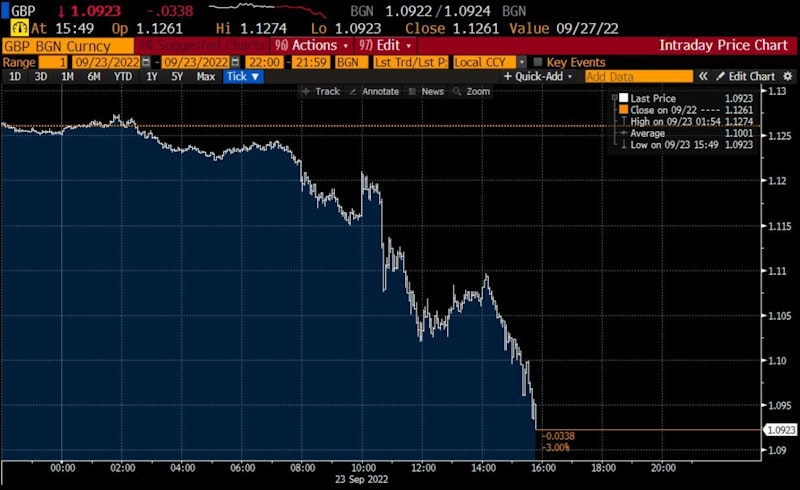In the News
The Mini Budget - A Chancellor Risking Financial Instability

23rd September 2022
In more than thirty-five years of teaching economics, I have never encountered anything quite like what was announced by the new Chancellor today in his so-called "mini-budget".
I'm an unashamed critic of this budget. The government shies away from scrutiny of their measures by the OBR. This has the appearance of a budget of a party 12 years in power whose time horizon for governing has shortened considerably.
There is little plausible case for this blunt form of trickle-down economics. The risks that it backfires in higher market interest rates and a full-blown sterling crisis will be something to watch carefully in the months ahead.
The 45% top rate of tax has been scrapped. So too caps on bankers’ bonuses and planned rises in national insurance. Stamp Duty has been lowered along with a 1% reduction in the basic rate of income tax.
This is a fiscal stimulus worth up to £45 billion between now and 2026-27 - or just over 2% of GDP.
It has drawn parallels with the famous Barber Budget of 1972 that is now widely regarded by UK economic historians as a major mistake.
The budget adds a significant amount of extra demand into the economy at a time when the economy is technically in a recession but where unemployment is low and the estimated output gap is close to zero. The big risk is that such a loosening of fiscal policy - with billions of unfunded state borrowing - will lead to financial instability in the markets and a compensating extra tightening of monetary policy.
Financial markets are quick to see through what the chancellor is trying to do. The yield on 5-year government bonds has risen by 0.5% in one morning. Sterling has fallen sharply. Interest rates will likely rise again in November. Indeed the Bank of England may move rates higher with an emergency meeting of the Monetary Policy Committee.
Nothing can be ruled out. We could see base interest rates higher than 5% next year with all of the consequences for households and businesses trying to service extensive debts.

The sterling exchange rate has dropped more than 3% against the US dollar in less than a day of trading. It is now below £1 = $1.10. No doubt at some point it will stabilise and recover a little.
But the implication of what the financial markets in general and currency traders in particular feel about today’s mini budget is clear. It is a vote of no confidence in the fiscal policy measures announced by the Chancellor. Perhaps the biggest beneficiaries will be those who have “shorted” the pound in recent weeks?
A weak currency will also put upward pressure on bond yields making it more expensive for the government to borrow.
If UK interest rates do indeed hit 5.5% - as markets now expect - the impact for mortgage affordability will be the worst this country has seen since the late 1980s/early 1990s.
— Ed Conway (@EdConwaySky) September 23, 2022
That was probably the worst housing crash in the modern era.
This is not pretty at all. pic.twitter.com/8IO2xjK3x0

And then there are the wider distributional issues of the regressive tax changes announced.
The tax changes are deeply ideological rather than rooted in sound empirical evidence. The government believes that tax cuts for the rich drive stronger economic growth which in turn increases tax revenues for the government.
But millions of people will see little gain in their disposable incomes at a time when the harsh reality of the cost-of-living crisis is impossible to ignore. As the Institute for Fiscal Studies have said today, taking into account all of the tax and benefit changes announced today and already in the pipeline for the next couple of years:
- If your income is < £155k, you lose
- If your income is > £155k you win
- If your income > £1m you gain more than £40,000
Paul Johnson from the Institute for Fiscal Studies provides a pithy and considered view below.
I've linked below to a selection of comment and analysis pieces from today.
The big British economic gamble https://t.co/Qvrn4LbNkR | opinion
— Financial Times (@FT) September 23, 2022
Kwarteng accused of reckless mini-budget for the rich as pound crashes https://t.co/5FaaZMdw3M
— Guardian Business (@BusinessDesk) September 23, 2022
You might also like

Questioning the UK’s Economic Recovery - Exam Style
29th January 2015
Revision Presentation - UK Economy and the EU
Teaching PowerPoints

Evidence on persistent poverty in the UK
18th October 2015

Should the UK Government support the British Steel Industry?
12th April 2016
Brexit - The UK and the EU - Updated Presentation (2016)
Teaching PowerPoints

Austerity fatigue sets in
17th July 2017
Universal Basic Income - Student Essay
Study Notes
Direct Taxes
Topic Videos
Daily Email Updates
Subscribe to our daily digest and get the day’s content delivered fresh to your inbox every morning at 7am.
Signup for emails